 This series just keeps getting better and better! Mercy Thompson is a lot of things: a VW mechanic, walker who can go shift into a coyote, and above all, a really good friend. The last is demonstrated by her willingness to go against powerful forces when her friend, mentor, and former boss Zee is arrested for a murder he did not commit. Mercy sets out to prove his innocence even though it may mean upsetting the very powerful and very vengeful fae. Years before the fae revealed themselves to the human world with mixed results. Many fae now live on reservations away from humans who are largely afraid of them.When a human is killed and Zee is found at the scene of the crime, he becomes the obvious suspect. The powers that be in the fae world know Zee is innocent but are willing to risk losing one of their own to appease human law enforcement and put the case to bed. That is not okay with Mercy.
This series just keeps getting better and better! Mercy Thompson is a lot of things: a VW mechanic, walker who can go shift into a coyote, and above all, a really good friend. The last is demonstrated by her willingness to go against powerful forces when her friend, mentor, and former boss Zee is arrested for a murder he did not commit. Mercy sets out to prove his innocence even though it may mean upsetting the very powerful and very vengeful fae. Years before the fae revealed themselves to the human world with mixed results. Many fae now live on reservations away from humans who are largely afraid of them.When a human is killed and Zee is found at the scene of the crime, he becomes the obvious suspect. The powers that be in the fae world know Zee is innocent but are willing to risk losing one of their own to appease human law enforcement and put the case to bed. That is not okay with Mercy.Iron Kissed, book number three in the Mercy Thompson series, was really interesting. At the end it got really heavy, tackling issues like sexual assault, identity, and what consent really means. It blew me way. I didn't expect such intensity from a series centering around werewolves, vampires, fae, and ghosts. Paranormal might be seen as escapist fare, but this series is grounded in real emotions.
Mercy is quickly becoming my favorite paranormal heroine. She is such a richly drawn character. She is tough and vulnerable, lonely but resistant to entering a relationship, and always, always, a formidable challenge. People continually underestimate her to their detriment. She cares about everyone. Making her different from everyone else - she's not a werewolf, a vampire, fae, or entirely human - allows her a degree of empathy that extends beyond her own "family" or "species" in a way other characters aren't able to.
The guys of the Mercy Thompson series are pretty awesome too. Brigg does a great job of writing men who are strong and powerful without being too obnoxious and controlling, or at least who are confronted with their obnoxiousness when needed. Not that they don't have their issues, but on the whole the men in Mercy's life are good guys. There's Adam, the local pack alpha. He is a leader who understands the importance of taking the time to hear what his pack members have to say. He walks a fine line between being dominant without being excessively domineering, well most of the time. He wants Mercy as his mate but will not coerce her into it. Sam, Mercy's first love, still cares about her but is as unsure as Mercy is as to what the future holds for them. They are both protective of her but try to resist protecting her too much. Warren and Kyle's relationship is also refreshing to read about. Warren, not surprisingly, still has to deal with issues related to members of the wolf pack who don't accept his sexuality but it is clearly their problem, not Warren's. He has settled nicely into his relationship with Kyle. Even Ben, the British werewolf who was so obnoxious in earlier books, comes off rather nicely in Iron Kissed. I hope there is more of Ben in future books.
In sum, I am really loving this series.
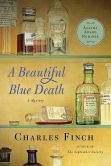 A Beautiful Blue Death is the
A Beautiful Blue Death is the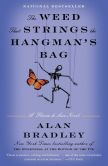 Flavia de Luce is back at it again - roaming around the village of Bishop's Lacey on Gladys (her bicycle), dreaming up ways to vanquish her opponents (especially her sisters) with poisonous concoctions, having adventures, and best of all, solving murders.
Flavia de Luce is back at it again - roaming around the village of Bishop's Lacey on Gladys (her bicycle), dreaming up ways to vanquish her opponents (especially her sisters) with poisonous concoctions, having adventures, and best of all, solving murders. 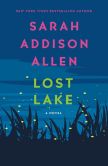 Garden Spells was the first time I heard of Sarah Addison Allen. It was the cover that got me. A woman in a fancy dress kneeling in a garden with big juicy apples scattered around. I was as captivated by words between the covers as I was by the front cover. Then there was The Sugar Queen which among other things featured a woman for whom books magically appeared around her whenever she had a problem that needed solving. Thinking about buying a house - poof! There's a book about first time home ownership on the nightstand that was previously empty. How could I not love that? I can't lie. The Girl Who Chased the Moon was a bit of misstep, although I did love the cover - a woman in a white dress kneeling and surrounded by butterflies. Though it was not my favorite it wasn't a bad way to spend a couple hours. All missteps were forgotten with The Peach Keeper, set in Walls of Water, a town Addison drew so vividly I wish I could visit. And now there is Lost Lake.
Garden Spells was the first time I heard of Sarah Addison Allen. It was the cover that got me. A woman in a fancy dress kneeling in a garden with big juicy apples scattered around. I was as captivated by words between the covers as I was by the front cover. Then there was The Sugar Queen which among other things featured a woman for whom books magically appeared around her whenever she had a problem that needed solving. Thinking about buying a house - poof! There's a book about first time home ownership on the nightstand that was previously empty. How could I not love that? I can't lie. The Girl Who Chased the Moon was a bit of misstep, although I did love the cover - a woman in a white dress kneeling and surrounded by butterflies. Though it was not my favorite it wasn't a bad way to spend a couple hours. All missteps were forgotten with The Peach Keeper, set in Walls of Water, a town Addison drew so vividly I wish I could visit. And now there is Lost Lake.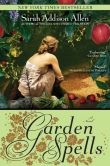
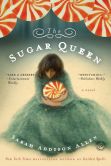
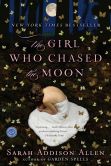
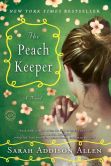
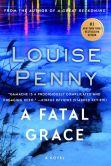 CC de Poitiers was a miserable woman who made everyone around her miserable: her husband, her child, her lover, and just about anyone who happened to cross her path. Her philosophy in life was not to show emotion, though she herself showed a lot of emotion. Her favorite seemed to be anger. When she dies, electrocuted while watching a curling match on a frozen pond no less, no one is particularly upset. Still, Inspector Armand Gamache must discover her murderer and bring him or her to justice even if some might think the world is better off with CC de Poitiers. He is also tasked with solving the murder of a homeless woman as part of his annual ritual of swapping cold cases with a colleague in another city. No worries, Inspector Gamache is up for the job.
CC de Poitiers was a miserable woman who made everyone around her miserable: her husband, her child, her lover, and just about anyone who happened to cross her path. Her philosophy in life was not to show emotion, though she herself showed a lot of emotion. Her favorite seemed to be anger. When she dies, electrocuted while watching a curling match on a frozen pond no less, no one is particularly upset. Still, Inspector Armand Gamache must discover her murderer and bring him or her to justice even if some might think the world is better off with CC de Poitiers. He is also tasked with solving the murder of a homeless woman as part of his annual ritual of swapping cold cases with a colleague in another city. No worries, Inspector Gamache is up for the job.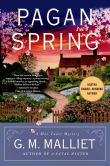 Pagan Spring is the third book in the Max Tudor mystery series by G.M. Malliet. Malliet's series is set in a bucolic English village led by MI-5 agent turned Anglican priest, Max Tudor. Tudor may have thought he was escaping the violence and ugliness of the world when he entered the priesthood. Instead with Pagan Spring Tudor encounters his third murder since arriving in Nether Monkslip. It all begins with a dinner party to welcome the recent addition of a minor celebrity to the village.
Pagan Spring is the third book in the Max Tudor mystery series by G.M. Malliet. Malliet's series is set in a bucolic English village led by MI-5 agent turned Anglican priest, Max Tudor. Tudor may have thought he was escaping the violence and ugliness of the world when he entered the priesthood. Instead with Pagan Spring Tudor encounters his third murder since arriving in Nether Monkslip. It all begins with a dinner party to welcome the recent addition of a minor celebrity to the village.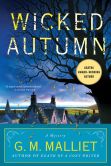
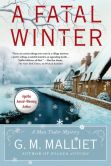
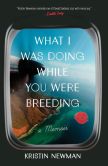 What I Was Doing While You Were Breeding is Kristin Newman's memoir about how she spent her time from her mid-twenties through her thirties while many of her friends were off getting engaged, getting married, and having babies. A television writer, Newman spent much of her free time in between writing jobs traveling to destinations far and near. Okay, mostly far. She went to Paris, Amsterdam, Russia, London, Argentina (multiple times), Brazil, the Dominican Republic, New Zealand, Australia, Iceland, Israel, and Jordan. In every port, or at least most of them, there was a boy to help her pass the time, sometimes multiple boys in the same port.
What I Was Doing While You Were Breeding is Kristin Newman's memoir about how she spent her time from her mid-twenties through her thirties while many of her friends were off getting engaged, getting married, and having babies. A television writer, Newman spent much of her free time in between writing jobs traveling to destinations far and near. Okay, mostly far. She went to Paris, Amsterdam, Russia, London, Argentina (multiple times), Brazil, the Dominican Republic, New Zealand, Australia, Iceland, Israel, and Jordan. In every port, or at least most of them, there was a boy to help her pass the time, sometimes multiple boys in the same port.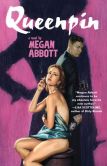 Queenpin is so good! So very good. The unnamed narrator is a girl from a good Christian family. She was raised right, but all she wants is bad. Her hardworking dad gets her job at Tee Hee, a bar on his delivery route. She spends her mornings in accounting class, her afternoons keeping Tee Hee's books, and her evenings keeping house. She doesn't think twice when her bosses ask her to "cook the books." She knows her bosses aren't the real bosses and that this won't probably end well, but she's willing to go along for the ride.
Queenpin is so good! So very good. The unnamed narrator is a girl from a good Christian family. She was raised right, but all she wants is bad. Her hardworking dad gets her job at Tee Hee, a bar on his delivery route. She spends her mornings in accounting class, her afternoons keeping Tee Hee's books, and her evenings keeping house. She doesn't think twice when her bosses ask her to "cook the books." She knows her bosses aren't the real bosses and that this won't probably end well, but she's willing to go along for the ride.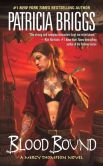 Blood Bound is the second book in the Mercy Thompson series by Patricia Briggs. Mercy is a walker who can turn into a coyote. For reasons I don't totally understand yet (beyond the fact of being different animal) this makes her strikingly different from the werewolves she grew up around. In the paranormal world Briggs has created, there are werewolves, vampires, fae, and walkers, or else at least one walker, as so far Mercy seems to be the only one. Humans have known about the fae for a while but have only recently found out that werewolves are real. The vampires have wisely decided to keep their existence a secret, at least for the time being.
Blood Bound is the second book in the Mercy Thompson series by Patricia Briggs. Mercy is a walker who can turn into a coyote. For reasons I don't totally understand yet (beyond the fact of being different animal) this makes her strikingly different from the werewolves she grew up around. In the paranormal world Briggs has created, there are werewolves, vampires, fae, and walkers, or else at least one walker, as so far Mercy seems to be the only one. Humans have known about the fae for a while but have only recently found out that werewolves are real. The vampires have wisely decided to keep their existence a secret, at least for the time being.